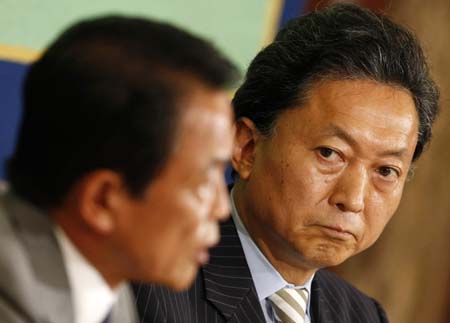As official campaigning got under way for the Aug. 30 election, the Democratic Party of Japan (DPJ) fielded a record-high 59 candidates for proportional-representation (PR) only seats, while the governing Liberal Democratic Party (LDP) fielded a record-low 37, reflecting the political mood of a country where the current buzzword is "seikenkotae" (a change of government).
 |
|
Japan's main opposition Democratic Party leader Yukio Hatoyama (R) looks at Japanese Prime Minister Taro Aso, who is also Japan's ruling Liberal Democratic Party leader, during a debate session with other parties leaders in Tokyo August 17, 2009.[Xinhua] |
In Japan, voters choose both a political party and constituency candidate when they vote. The votes for political parties are then tallied up throughout 11 block districts, and seats are distributed using proportional representation. Meanwhile, local seats are decided using the first-past-the-post system.
In the past, this has meant that often parties will ask their supporters to vote for smaller allies to gain more seats overall through partnerships. For example, in previous elections, the LDP has asked its supporters to vote for its ally New Komeito at a local level and itself at district level. By doing this, the LDP could guarantee that in places where its smaller partner has a stronger support base, it picks up PR votes while helping New Komeito stand a better chance of getting the local seat, thus helping the coalition gain more power in the Diet.
By fielding 59 proportional-representation only candidates, the DPJ is essentially expressing the confidence it has that political change is coming to Japan. In strongholds where the LDP on New Komeito is all but guaranteed to win the local seats, the party is still confident it can pick up a significant number of votes at district level.
Some 480 candidates will be chosen during Japan's Aug. 30 election for the House of Representatives. Most - 300 - will be selected using the first-past-the-post system, and 180 will be elected at district level.
With just 37 PR only candidates running for the LDP, it seems that despite the party's claim that its experience means it is the only viable option come Aug. 30, its political strategists are not confident that the party will fare well in the election. The LDP is also placing candidates it thinks may lose in local elections toward the top of its P.R. list.
Because the DPJ set to join a coalition with the People's New Party and Social Democratic Party, only 263 of its candidates at constituency level will go head-to-head with the LDP, as the party aims to pick up district-level votes in areas where its allies are expected to perform strongly.
In 2005, the LDP won 219 local seats and 77 block seats, while the DPJ won just 52 local seats and 61 block seats. That election, however, came to be known as the "postal vote" after a masterstroke of political maneuvering by the Prime Minister Junichiro Koizumi led to the election being considered a referendum on whether or not Japan's postal services should be privatized.
Since then, voter discontent has grown as a series of scandals have tainted the governing party, including one in which millions of pension records were lost in the country.
In 2007, voters seemed to punish the LDP for this and other mistakes when the DPJ swept to power in the House of Councilors, winning a majority in this house and leaving the Diet deadlocked.
If, as predicted, the DPJ gain a majority in the Lower House on Aug. 30, then for the first time in two years, a single party (with its smaller partners) will control both chambers of the Diet and be able to push through policies efficiently and without the need for opposition support. Political change may indeed be on the way.
(Xinhua News Agency August 17, 2009)